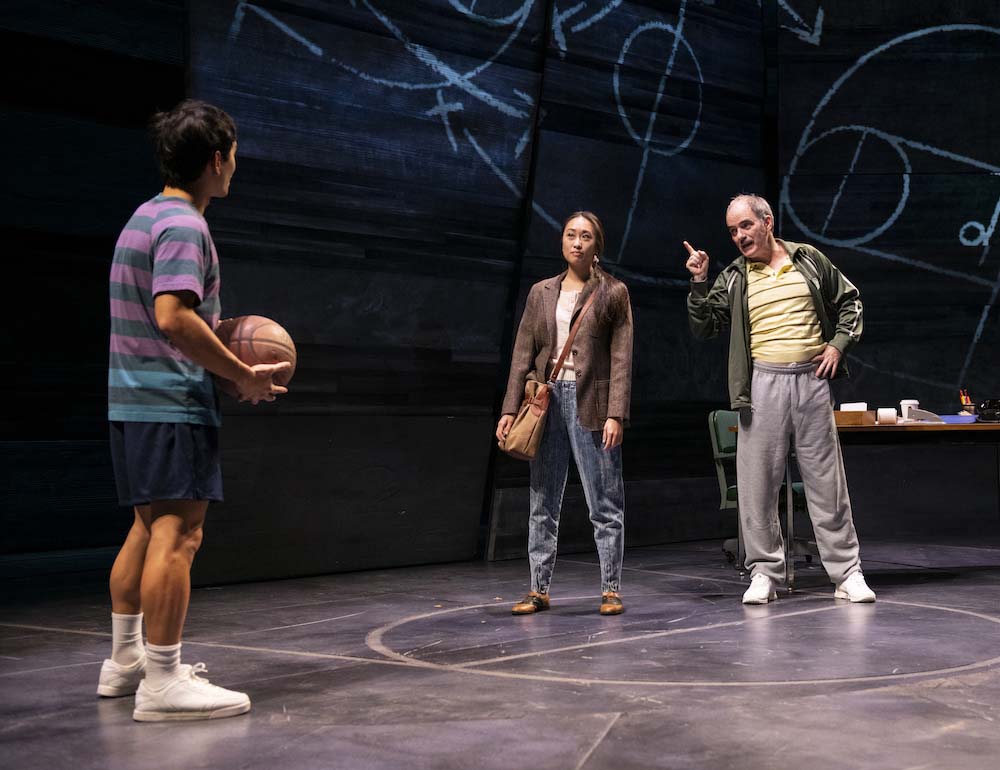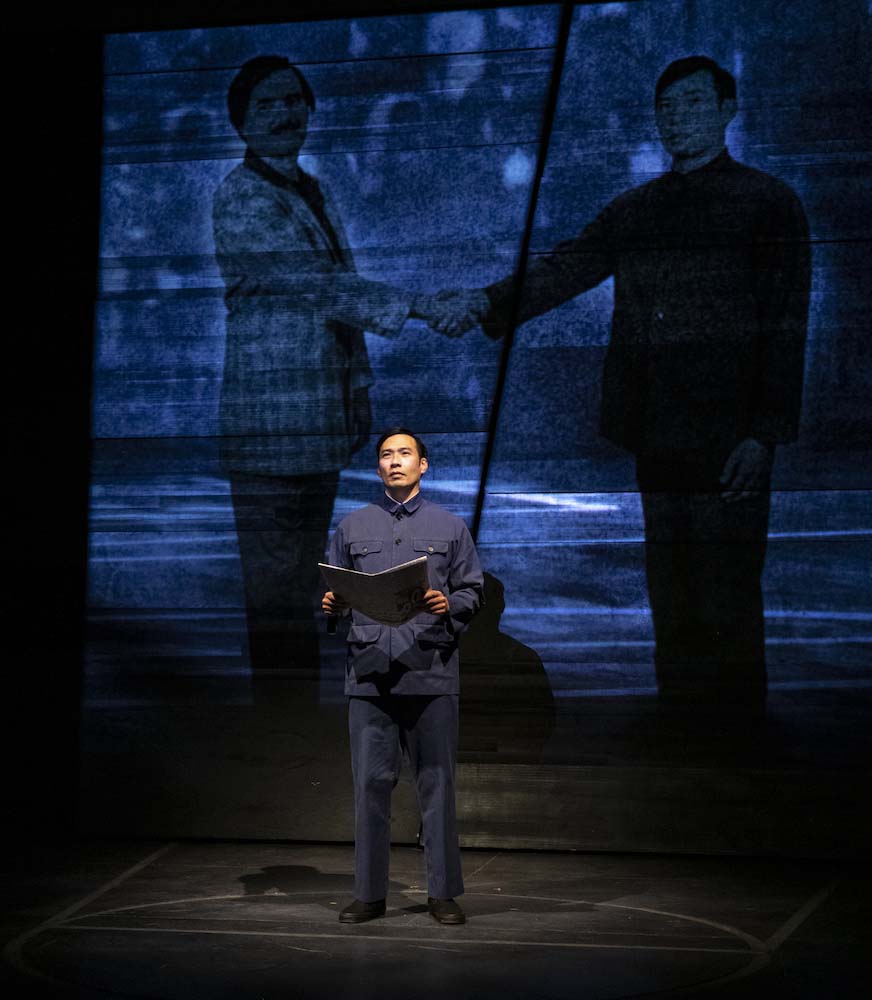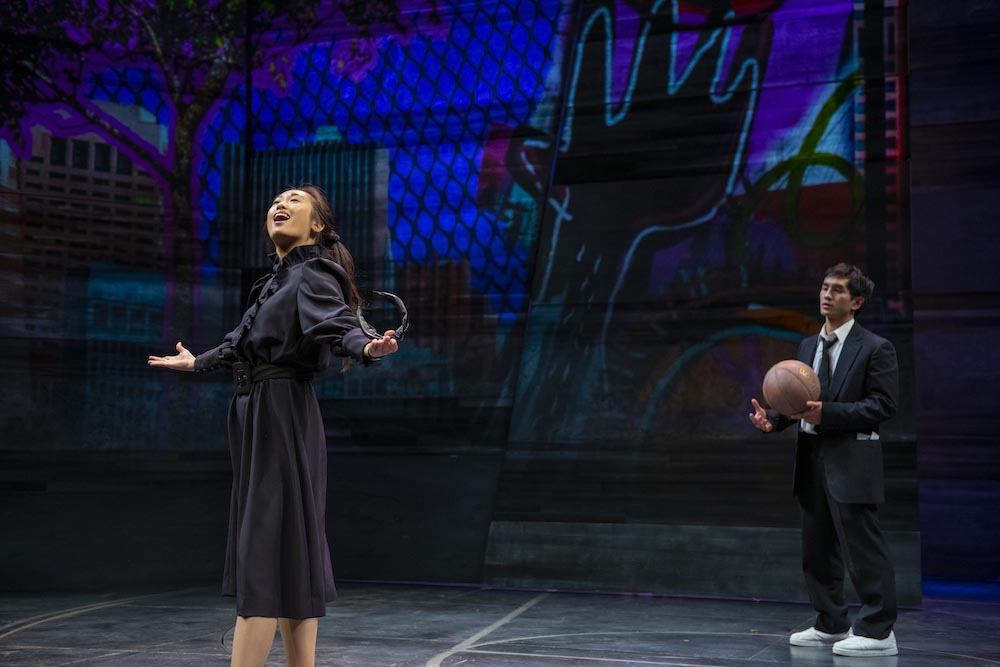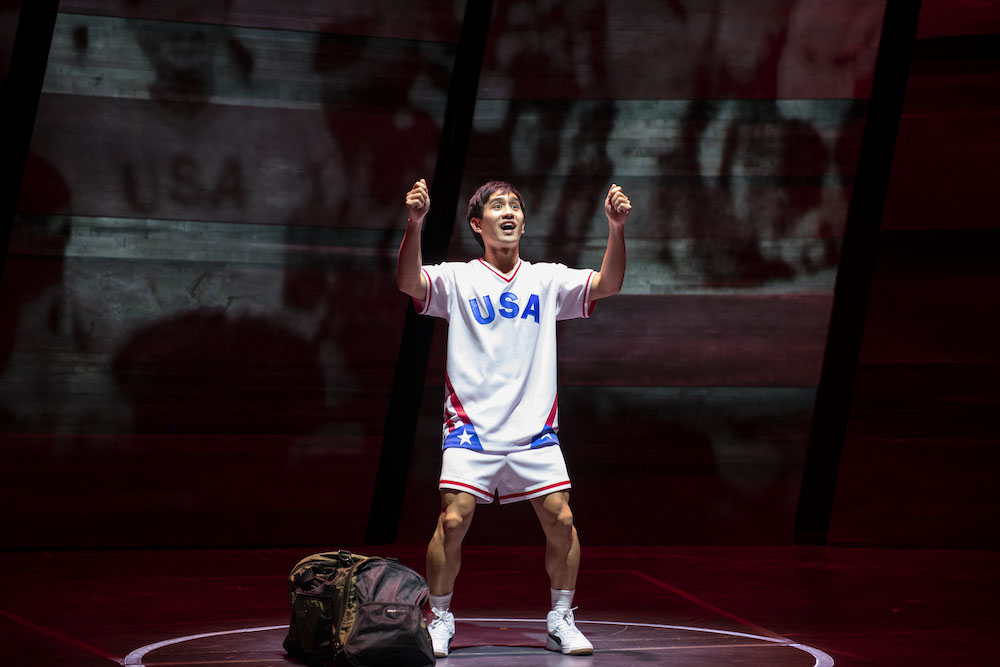“my whole life, i had been taught that it was not my moment. it would never be. but now i see: it has always been my turn.” — basketball coach Wen Chang in The Great Leap
Growing up, when my mom’s side of the family got together, my Wowo (what we call my Lolo/grandpa), Dad, and the titos (uncles) would play basketball against the little boys. “The Fireballs,” we called the team. They’d don specially designed jerseys, and the grownups would let the kids beat them. As they grew up, the boys got pretty good. It was in honor of Wowo, who played basketball in college in the Philippines. Watching Lauren Yee’s The Great Leap at Round House reminded me of the joy of those times growing up.
Yee’s play was inspired by her own father’s short-lived basketball career. Now playing in its regional premiere directed by Jennifer Chang, The Great Leap follows a 1989 San Francisco basketball team going to China for a rematch “friendship game.” Young Manford (Randy Nguyen Ta) manages to get himself onto the team after proving himself to the coach, Saul (Eric Hissom). He’s looking for more than just a game (his personal stakes are revealed later). It takes the convincing of his cousin, Connie (Lois Shih), before he can go. As they land in Beijing right before the Tiananmen Square uprising, Manford, Saul, and their Chinese translator/coach Wen Chang (Grant Chang) must reconcile the way they view basketball, life, and their histories. Jumping back in time, the play also explores how Wen Chang and Saul first met.

I do wish the play had been one tight one-act. The first act is mainly exposition, and the big explosive events all happen in the second. We could have gotten to China more quickly. I was left with several questions: Was it successfully simultaneously an Asian story and an Asian American one? Who do we care the most about? A lot of the marketing for this story has been Manford-focused, but I felt it was more of Wen Chang’s story. With Wen Chang as the framing device, starting and ending, how is Manford the main focus when his story is tucked in between and we don’t know his ending? But you want to see Manford win, as he takes his final shot in the dark.
It’s been a while since I’ve seen a play by an AAPI playwright in person, and it was special for this to be my first review since the pandemic. I know what it’s like to want to carve out your own path and go after it no matter what, like Manford. I know what it’s like to be the “cousin” who is basically a real cousin, on the sidelines doing your best to support your loved ones, like Connie. I know what it’s like to feel you have to push through, not show weakness and do what you can to survive, like Wen Chang.

Grant Chang is a powerful presence as Wen Chang, the driving force of this play. The turmoil in his stillness is palpable, as he faces and addresses the complexities of living amidst the Cultural Revolution. His delivery of Wen Chang’s letters, where he brought poetic beauty to everyday speech as a narrator, was the most poignant. At the beginning, it did seem to defy time and place despite being rooted in history. His two letters in the second act struck a chord.
Randy Nguyen Ta captures Manford’s relentlessness and passion, from swaggering “proving I know what I’m doing” tactics, to loss in the scenes when he’s not allowed to play, to the reclaiming power of his final game. From his first scene convincing Saul to let him onto the team, he is grounded despite all the energy emanating from his face and his hands. You can see the sparkle in his eyes as he says he’s the best player in Chinatown. It’s not desperate; he just knows he’s good.
Eric Hissom portrays Saul with comedic dexterity, playing off of the people he initially competes against with the energy to match and up them. Seeing how he gives the setup for the comedy in misunderstanding and what gets lost in translation by Wen Chang, in the “translating” scenes, the banter is done respectfully; it never feels like either bears the full brunt of looking unaware.

Lois Shih as Connie is a sweet older cousin, representing the importance of family and a specific perspective as an Asian American woman. In her first scene, she swept the stage with her high level of energy, at times seeming a bit over the top but understandably trying to pump up her cousin. Her phone call scene in the second act is grounded and the best example of her bringing stability to Manford’s life.
For a small cast and minimal set pieces, the actors fill out the stage thanks to their physicality and movement. Basketball moves in non-basketball moments — from Manford and Saul fumbling for Saul’s grocery bag while Manford accosts him again trying to get onto the team, to Manford fully point guard blocking Connie in one scene — make it seem like it’s a game throughout. The one actual basketball game doesn’t have physical balls on the stage. Manford mimes every pass, an interesting choice that adds to feelings of twisted reality.
Some of the blocking has actors being open out to the audience, not speaking to scene partners, which I found interesting. While it adds to the “fable out of reality” vibe that comes with Lauren Yee’s plays, and while it is sometimes necessary for narration, at times moments lacked emotional punch because people weren’t looking directly at each other quite enough, in two-person scenes with high stakes.
This constant motion is highlighted by the set, designed by Tony Cisek, with projections by Jason H. Thompson and Kaitlyn Pietras. The movable upstage set piece detached and came back together with ease, as a strong background for projections. In the projections, you could see big pictures, then zoom in on the smaller moments captured by history … and the final moment of sitting with the final image and nothing else onstage left me with chills.
The lighting design (Minjoo Kim) and sound design (Roc Lee) complement these moments, especially during and after the final basketball game and the scenes involving Tiananmen Square. The costumes by Helen Huang serve each character well; for Manford alone, he wears a suit for the entire first act, which makes his final jersey that he wears with pride later all the more deserved.

I would be remiss not to acknowledge some of the hurt that has arisen around the production. I’ll let the comments speak for themselves, but I do want to encourage Round House to cast from the local AAPI community when we so rarely get the chance to tell our own stories in the area. I am aware that there is more behind the scenes and there is anguish in even bringing this up, but while I have a platform I’m not going to ignore the extra context that comes with this production in the DMV.
That being said, the focus of this review is on the human stories out of the headlines. I am excited for the people who get to tell this story. We need to celebrate this story if we want more AAPI plays of this scale. I want to do what I can to uplift this cast and production team because AAPI voices from everywhere must be heard.
All in all, The Great Leap is a solid production, and a wonderful way of celebrating AAPI artists. It serves the material; if you wait, everything set up at the beginning pays off at the end. There’s some level of distance in a show that’s not exactly reality. But this was a story that you could understand even if you don’t know basketball well or if you don’t necessarily know all the historical context. This AAPI story is a universal one, and wow, how we need more of them.
Running Time: 2 hours, including a 15-minute intermission.
The Great Leap performs through December 5, 2021, in person at Round House Theatre, 4545 East-West Highway, Bethesda MD. For in-person tickets ($51–$68), call (240) 644-1100 or go online. (Information about available discounts can be found here.) The Great Leap also streams on-demand beginning November 26. Purchase virtual tickets ($30) here.
The online program is available here.
COVID Safety: Patrons must show proof of COVID-19 vaccination upon entry and wear masks while attending performances, with limited exceptions. Click here for full details.
SEE ALSO:
Round House Theatre to reopen with six-play round-the-world season




